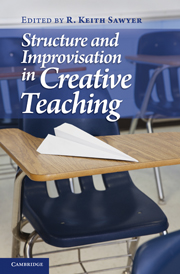Book contents
- Frontmatter
- Contents
- Table and Figures
- Notes on Contributors
- Foreword
- 1 What Makes Good Teachers Great?
- Part 1 The Teacher Paradox
- 2 Professional Improvisation and Teacher Education
- 3 Creativity, Pedagogic Partnerships, and the Improvisatory Space of Teaching
- 4 Improvising within the System
- 5 Teaching for Creativity with Disciplined Improvisation
- Part 2 The Learning Paradox
- Part 3 The Curriculum Paradox
- Index
- References
4 - Improvising within the System
Creating New Teacher Performances in Inner-City Schools
Published online by Cambridge University Press: 05 June 2012
- Frontmatter
- Contents
- Table and Figures
- Notes on Contributors
- Foreword
- 1 What Makes Good Teachers Great?
- Part 1 The Teacher Paradox
- 2 Professional Improvisation and Teacher Education
- 3 Creativity, Pedagogic Partnerships, and the Improvisatory Space of Teaching
- 4 Improvising within the System
- 5 Teaching for Creativity with Disciplined Improvisation
- Part 2 The Learning Paradox
- Part 3 The Curriculum Paradox
- Index
- References
Summary
Teachers’ lives are dominated by scripts: the overt scripts of the curriculum, the “hidden” scripts of race, class, language, and culture, and the societal scripts of how teachers and students are supposed to relate to each other. All of these, however, are informed by the meta-script that the primary job of the teacher is to help children acquire knowledge and skills – a deeply embedded cultural model of teaching and learning that has been referred to as instructionism (Papert, 1994), as transmission and acquisition (Rogoff, 1990; Sfard, 1998), or as the banking model (Freire, 1994). Teachers are supposed to find the best techniques for helping children learn more so that they can know more. Reform efforts that aim at addressing the current problems in education generally attempt to make such learning more efficient, equitable, or accountable through smaller classes, culturally relevant pedagogy, and a major focus on testing and assessment. By many accounts (Darling-Hammond, 2007; Kohn, 2004; Kozol, 2005; Meier & Wood, 2004; Sizer, 2004), these efforts are not succeeding.
Information
- Type
- Chapter
- Information
- Structure and Improvisation in Creative Teaching , pp. 73 - 93Publisher: Cambridge University PressPrint publication year: 2011
References
Accessibility standard: Unknown
Why this information is here
This section outlines the accessibility features of this content - including support for screen readers, full keyboard navigation and high-contrast display options. This may not be relevant for you.Accessibility Information
- 8
- Cited by
